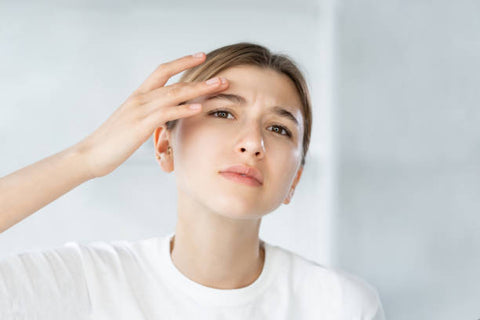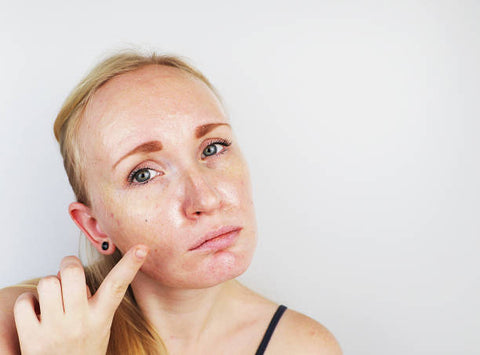What is Oily Skin?
Oily skin is a skin type that is characterized by an overproduction of oil, which can lead to a range of skin issues including acne, blackheads, and clogged pores. If you have oily skin, you know it can be a challenge to keep your skin looking and feeling fresh. But with the right skincare routine and lifestyle habits, you can keep your skin looking its best.

In this blog, we’ll explore the causes of oily skin, the best skincare products and treatments to keep your skin healthy, and lifestyle changes you can make to manage your oily skin.
What Causes Oily Skin?
Oily skin is caused by an overproduction of sebum, which is an oily substance produced by the sebaceous glands. Factors that can contribute to oily skin include hormones, genetics, diet, and lifestyle.

Tips for Managing Oily Skin
Do you have oily skin? If so, you know how difficult it can be to manage and keep your skin looking clear and healthy. Oily skin is caused by overactive sebaceous glands, which produce excess sebum. This sebum can clog pores and lead to acne breakouts, blackheads, and other skin issues. Here are some tips for managing oily skin:
Cleanse Regularly
It’s important to cleanse your face twice a day—once in the morning and once at night—to keep your skin free from impurities and excess sebum. Use a gentle cleanser that is specifically formulated for oily skin. Avoid cleansers with harsh ingredients, as they can strip your skin of its natural oils and cause further irritation.
Exfoliate
Exfoliation is key for managing oily skin. This helps to remove excess sebum, dirt, and dead skin cells that can clog pores and cause breakouts. Use an exfoliating scrub once or twice a week to help keep your pores clear. Avoid exfoliating too often, as this can strip your skin of its natural oils.
Moisturize
Although it may seem counterintuitive, it’s important to moisturize your skin, even if it’s oily. Moisturizing helps to balance out the production of sebum, which can help reduce the appearance of oily skin. Use a lightweight, oil-free moisturizer to help keep your skin hydrated and healthy.
Use Oil-Free Products
Opt for oil-free products whenever possible. This includes makeup, skincare products, and sunscreen. Oil-free products help to reduce the amount of oil on your skin, which can help minimize breakouts and keep your skin looking fresh.
Avoid Heavy Makeup
Layering on heavy makeup can make your skin look greasy and clog your pores. If you do wear makeup, opt for products that are specifically designed for oily skin. Look for oil-free, non-comedogenic products that won’t clog your pores.
Simplify Your Choices: Product Suggestions
Sebo Rx Face Wash by Cosmoderm India - For Acne and Excess Oil on Skin
Acne Derma Allantion & Vitamin-E soap - For Oily and Acne Prone skin
Sebo Rx Soap by Cosmoderm India - For Acne and Excess Oil on Skin
Home remedies for oily skin
1. Use a Mixture of Baking Soda and Water:
Baking soda can be used as an effective home remedy for oily skin. Make a paste of baking soda and water and apply it to the face. Leave it on for a few minutes before rinsing with warm water.
2. Use Apple Cider Vinegar:
Apple cider vinegar helps to balance the pH levels of the skin and reduce excess oil production. Mix a few tablespoons of apple cider vinegar with water and apply it to the face using a cotton ball. Leave it on for 15 minutes before rinsing off.
3. Use Lemon Juice:
Lemon juice is a great astringent for oily skin. Apply freshly squeezed lemon juice to the face and leave it on for 15 minutes before rinsing off with warm water.
4. Use Oatmeal:
Oatmeal is an excellent exfoliant and can help absorb excess oil from the skin. Make an oatmeal scrub by mixing oatmeal and water into a paste. Apply it to the face and massage gently in circular motions. Leave it on for 10 minutes before rinsing off.
5. Use Yogurt:
Yogurt is a natural source of lactic acid, which is great for exfoliating oily skin. Apply plain, unflavored yogurt to the face and leave it on for 15 minutes before rinsing off.
6. Use Aloe Vera Gel:
Aloe vera gel is a great treatment for oily skin. Apply aloe vera gel to the face and leave it on for 15 minutes before rinsing off.
7. Use a Clay Mask:
Clay masks help absorb excess oil and improve skin texture. Apply a clay mask to the face and leave it on for 15 minutes before rinsing off.













1 comment
I was diagnosed with Herpes four years ago. For over two years, I relied on prescribed medications and treatments, but unfortunately, my condition continued to worsen. The flare-ups became more frequent, the discomfort increased, and even simple daily tasks became difficult to manage.Last year, out of desperation and hope, I decided to try a herbal treatment program from NaturePath Herbal Clinic. Honestly, I was skeptical at first, but within a few months of starting the program, I felt some changes. My discomfort eased, my energy levels improved, and I felt I had more control over my daily life again.It’s been a meaningful experience for me, and I feel more like myself than I have in years. This is simply my personal story. You can visit their website at www.naturepathherbalclinic.com
info@naturepathherbalclinic.com